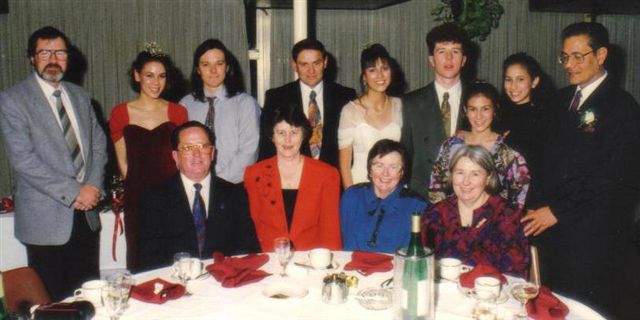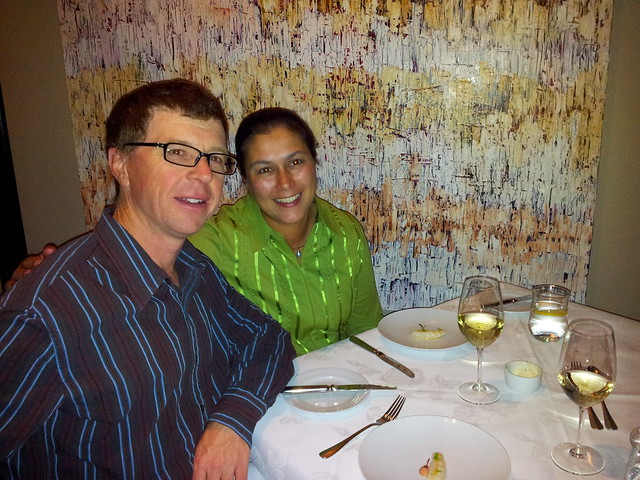 Believe it or not, this is the Lord’s prayer – the form for prayer that Jesus taught his disciples. In this image, it kind of looks familiar and kind of draws attention but we kind of don’t really get what it’s about.
Believe it or not, this is the Lord’s prayer – the form for prayer that Jesus taught his disciples. In this image, it kind of looks familiar and kind of draws attention but we kind of don’t really get what it’s about.
And perhaps that’s just like prayer: as easy as speaking to our Father, mentioned in so many Christian conversations, but not something in which we ever feel mastery.
I decided we’d look at prayer in our family Bible reading. Using the Lord’s prayer, as recorded by Matthew. Here’s how we did it.
Method
Each evening, after dinner (that’s our usual time), I read Matthew 6:9-13. We then discussed one line of the prayer. Then we prayed it together by reading the Bible passage. The next night the pattern was repeated as we moved to the next line of the prayer. By the end, even our youngest non-reader was making a stab at saying the words of this prayer.
To finish the sequence of prayer devotions, we read Matthew 6:5-8 to hear Jesus’ warning about using prayer as a pathway to pride. By this stage we knew the words of the prayer … well, perhaps our five and seven year olds had less accurate recitation!
Content
Here, as far as I can recall, is what I highlighted for each line of the Lord’s prayer. It’s not written in the conversational dinner-time style, but the points are what we talked about.
Our Father in heaven
Prayer starts with God, the Father. We speak to him – we don’t send him a memo or an invoice. He’s Father! What’s more, all who trust him do this, God is our Father. Prayer, then, is a kind of family activity in which the children seek out the Father who is the giver of life. This is very worthwhile, because he is our Father in heaven, the place of real authority – he is the power above all.
Hallowed be your name
What’s in a name? A person’s character and reputation, that’s what. The name is the whole message and expression of God. And because it’s a word, it is communication. God’s name is spoken to people and received by people. When God’s name is spoken truly, people know God properly. God’s name, in a sense, is all of creation rightly listening to him. That is, God is hallowed, known as holy. That’s exactly what we want to see. So we ask for it.
Your kingdom come
God’s kingdom is not a space on a map. It is God’s rule, unchallenged and right. This line reminds us that God is the only ruler – I am not the king! It’s important to see that these two requests follow on from ‘Our Father in heaven.’ The Father, in the Bible, is responsible for the family. Sometimes even kings are called ‘father’ of their nation. And the kind of king/father we have is holy, because he’s in heaven.
In other words, to pray ‘Our Father in heaven’ is automatically to pray ‘Hallowed be your name, your kingdom come.’
Your will be done on earth as it is in heaven
There’s a third prayer request for something about God. What should we pray for as of first priority? For God’s rule and will and ways. The first good thing about prayer is that it rejoices in God’s name, kingdom and will.
Yet there’s a shadow in this prayer. To make these three requests is a reminder: God’s name is treated as mud, his king is ignored, and his will is flouted. This world is not right. So sad! What can be done!? Major news: Jesus shows that God uses prayer as he fixes this world. It’s a mystery how God does this. But we know what we need to know – that prayer, like the Lord’s prayer, is good in a world that does not yet do God’s will.
We can be confident in all these prayers, because Jesus prayed the same thing – three times! (Matthew 26:36-45) And God answered this prayer, through the cross of Jesus. God’s will was that the death of Jesus forgive us of sin. Certainly now God will hear our prayers, for we are his children.
Give us this day our daily bread
God loves us, because he’s our Father. No detail is beneath him. Our bread is a day by day need. Our bread is also a day by day prayer point. At the same time, this is a prayer that skewers greed. Instead of asking to own 1000s of bakeries, we ask for the day’s food. That’s plenty, for we will let tomorrow worry about itself.
Forgive us our debts as we also have forgiven our debtors
Debts are what we owe. They’re expensive, and it’s right to pay. The trouble is, we cannot pay our debt to God because our wrongs are so many. All we can do is ask for God to wipe away the debt.
But there’s more! We ask for forgiveness as we also forgive. Forgiveness, we see, is central to God’s kingdom. Everyone in God’s kingdom is a person of forgiveness: we love it. We love forgiveness from God, we love to show forgiveness to people, we love to encourage forgiveness between others. Everyone who loves God’s kingdom loves forgiveness.
Now look at when we ask for forgiveness: it’s after we speak to God as Father. We were already God’s children, as disciples of Jesus. We do not flip-flop into God’s family and out of it depending on ‘sins.’ When we trust Jesus, we are always in God’s family – always – though we will have to keep coming to God for help with our debts.

Lead us not into temptation, but deliver us from the evil one
After prayer, we keep living. As we live, we face temptation. It’s not bad to be tempted – what are some of your temptations or tests? The bad comes from within us, as we follow temptation and take pleasure in evil (or in the evil one). Since we do not want to dishonour God like this, we ask for his help. ‘Please don’t lead me that dangerous way, but help me go this good way.’
We see that prayer for the whole world is also prayer for me and for us. We will be changed by God, as we pray in the manner Jesus taught us.








